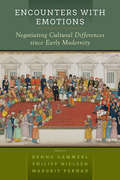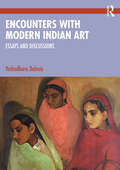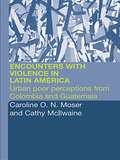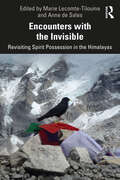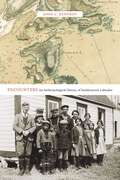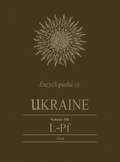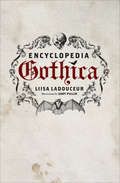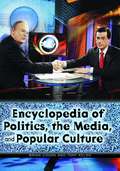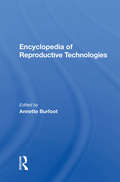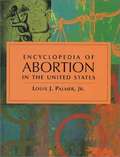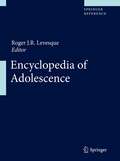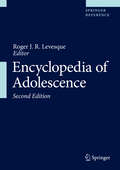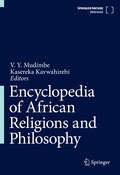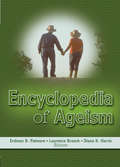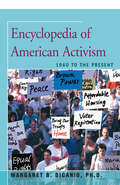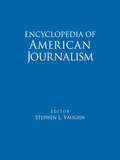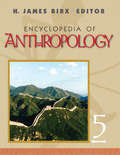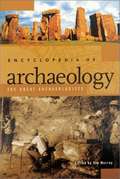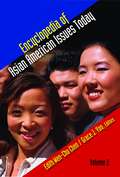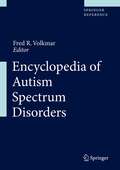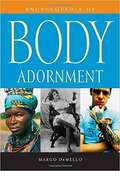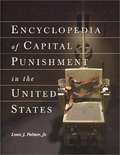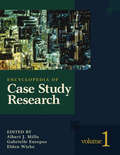- Table View
- List View
Encounters with Emotions: Negotiating Cultural Differences since Early Modernity
by Margrit Pernau Benno Gammerl Philipp NielsenSpanning Europe, Asia and the Pacific, Encounters with Emotions investigates experiences of face-to-face transcultural encounters from the seventeenth century to the present and the emotional dynamics that helped to shape them. Each of the case studies collected here investigates fascinating historiographical questions that arise from the study of emotion, from the strategies people have used to interpret and understand each other’s emotions to the roles that emotions have played in obstructing communication across cultural divides. Together, they explore the cultural aspects of nature as well as the bodily dimensions of nurture and trace the historical trajectories that shape our understandings of current cultural boundaries and effects of globalization.
Encounters with Emotions: Negotiating Cultural Differences since Early Modernity
by Benno Gammerl, Philipp Nielsen and Margrit PernauSpanning Europe, Asia and the Pacific, Encounters with Emotions investigates experiences of face-to-face transcultural encounters from the seventeenth century to the present and the emotional dynamics that helped to shape them. Each of the case studies collected here investigates fascinating historiographical questions that arise from the study of emotion, from the strategies people have used to interpret and understand each other’s emotions to the roles that emotions have played in obstructing communication across cultural divides. Together, they explore the cultural aspects of nature as well as the bodily dimensions of nurture and trace the historical trajectories that shape our understandings of current cultural boundaries and effects of globalization.
Encounters with Modern Indian Art: Essays and Discussions
by Yashodhara DalmiaThis book explores modern art in India, tracing its evolution from the setting-up of the Progressive Artists Group in the 1940s to the contemporary movements today. It discusses some of the fundamental issues around Indian art, such as the extent of its rootedness in the country, the amalgamation of Western art methods and Indian aesthetics in the art and its increasing infusion with popular modes.In a series of essays, the book looks at works from the late Mughal period, when artists began to move towards modernism, to the visionary approaches of artists like Rabindranath Tagore, Nandalal Bose, Ramkinkar Baij and Benodebehari Mukherjee in Santiniketan. It also explores innovative works of the Indo-Hungarian artist Amrita Sher-Gil and contributions of progressive artists such as Francis Newton Souza, Sayed Haider Raza and M.F. Husain to the new and experimental forms being practised in the present, highlighting the transformative role of modern Indian art through the twentieth century as the works of each successive generation reflect the socio-cultural contexts.With rich illustrations, the book will be of interest to students and educators of art, art history, intellectual and cultural history, as well as to connoisseurs of art.
Encounters with Violence in Latin America: Urban Poor Perceptions from Colombia and Guatemala
by Caroline Moser Cathy McIlwaineLatin America is both the world's most urbanized fastest developing regions, where the links between social exclusion, inequality and violence are clearly visible. The banal, ubiquitous nature of drug crime, robbery, gang and intra-family violence destabilizes countries' economies and harms their people and social structures.Encounters with Violence & Crime in Latin America explores the meaning of violence and insecurity in nine towns and cities in Columbia and Guatemala to create a framework of how and why daily violence takes place at the community level. It uses pioneering new methods of participatory urban appraisal to ask local people about their own perceptions of violence as mediated by family, gender, ethnicity and age. It develops a typology which distinguishes between the political, social, and economic violence that afflicts communities, and which assesses the costs of consequences of violence in terms of community cohesion and social capital. This gives voice to those whose daily lives and dominated by widespread aggression, and provides important new insights for researchers and policy-makers.
Encounters with the Invisible: Revisiting Spirit Possession in the Himalayas
by Anne De Sales Marie Lecomte–TilouineThis volume considers spirit possession in the Himalayas and the various ways in which invisible powers are made present. It does so by examining material representations of these powers through artefacts, animals, plants and natural substances, while also focusing on narratives of people’s encounters with the invisible that may help them to reconfigure reality. Through these two approaches, the contributions examine new phenomena associated with the concepts of "possession" and "shamanism", which otherwise tend to lead research into well-worn furrows. The book addresses a range of themes, including the gods of the Western Himalayas, death and ritual dissolution among Hyolmo Buddhists in Nepal, gods and rivers as legal persons in India, and the problem of conversion disorder in Nepal.Rich in ethnography, this book will be indispensable for scholars and researchers of anthropology, religion, spiritualism, sociology of religion, Himalayan studies, sociology and South Asia.
Encounters: An Anthropological History of Southeastern Labrador (McGill-Queen's Indigenous and Northern Studies #77)
by John C. KennedyA detailed history that challenges conventional understandings of southeastern Labrador.
Encyclopedia of Ukraine: L-Pf
by Danylo Husar StrukOver thirty years in the making, the most comprehensive work in English on Ukraine is now complete: its history, people, geography, economy, and cultural heritage, both in Ukraine and in the diaspora.
Encyclopedia Gothica
by Liisa Ladouceur&“Wickedly funny . . . Ideal for babybats and elder goths who&’ll appreciate the wealth of reminders of the experiences that make up goth life&” (NOW Magazine). A guidebook to the language of the most shadowy of subcultures, this work collects and defines more than 550 Gothic words and phrases. Compiled by an acclaimed Goth journalist and poet, this compendium provides insight into the unique vernacular of this fascinating community, describing in detail and with black humor the fashion, music, and lifestyle as well as sharing insider slang such as Babybat, Corp Goth, and the Gothic Two-Step. A Goth Band Family Tree and essential Goth listening, reading, and viewing recommendations are also included in this phantasmagorical work. &“Including illustrations from the talented Gary Pullin, Encyclopedia Gothica is the essential Goth reference whether you&’re wondering who Sisters of Mercy are or what absinthe is (and why Marilyn Manson has his own brand of the green stuff).&” —Geeks of Doom &“Ladouceur is a rare gem of a commenter that has the ability not only to laugh at herself, but to be able to get you to laugh at yourself, too.&” —HoustonPress &“Ladouceur has compiled a thorough and amusing encyclopedia about all-things-Goth . . . Whether you want to read about Nosferatu, Goth Juice or mall Goths you&’ll find brief and truly informative segments in Encyclopedia Gothica.&” —antiMusic &“Ladouceur&’s humor is a welcome rarity in an oft-misunderstood subculture.&” —Maclean&’s &“For those who continue to fear Goths, this book is a powerful antidote. Despite their spiky, menacing exterior, Encyclopedia Gothica details a culture as harmless and geeky as your average Star Wars fanboy or Kiss Army foot soldier.&” —National Post
Encyclopedia Of Politics, The Media, And Popular Culture
by Tony Kelso Brian A. CoganMedia in this country has helped shaped culture, which has affected politics, which in turn has influenced how those same media behave. The inter-relatedness of these societal elements is distinctive. Part I of this book is thematically organized by chapter examining these relationships from both a historical and contemporary perspective. Part II presented alphabetically arranged entries for people, programs, and events related to these subjects. The book succeeds at being a handy reference work, or just a fun volume to peruse. Annotation c2010 Book News, Inc., Portland, OR (booknews.com)
Encyclopedia Of Reproductive Technologies
by Annette BurfootThis collection of encyclopedic entries provides a broad-based appreciation of new reproductive technologies that includes accessible technological descriptions and their historical and social contexts. The collection is divided into five thematic areas: Theories of Reproduction Ancient to Contemporary; Early Reproductive Technologies; Post-War De
Encyclopedia of Abortion in the United States
by Louis J. PalmerEntries are included for each state, giving that state's legal history regarding abortion, with separate sections before and after Roe v. Wade. Each state entry includes tables and charts of abortion statistics by age, race, and marital status from 2000 through 2004, and also includes the full content of the state's codes. The entries have been updated in this edition to reflect changes in state and federal laws. Other entries describe medical conditions, pro-choice and pro-life organizations, and the voting record on abortion of each Supreme Court justice. Annotation ©2009 Book News, Inc., Portland, OR (booknews.com)
Encyclopedia of Adolescence
by Roger J.R. LevesqueThe Encyclopedia of Adolescence breaks new ground as an important central resource for the study of adolescence. Comprehensive in breath and textbook in depth, the Encyclopedia of Adolescence - with entries presented in easy-to-access A to Z format - serves as a reference repository of knowledge in the field as well as a frequently updated conduit of new knowledge long before such information trickles down from research to standard textbooks. By making full use of Springer's print and online flexibility, the Encyclopedia is at the forefront of efforts to advance the field by pushing and creating new boundaries and areas of study that further our understanding of adolescents and their place in society. Substantively, the Encyclopedia draws from four major areas of research relating to adolescence. The first broad area includes research relating to "Self, Identity and Development in Adolescence". This area covers research relating to identity, from early adolescence through emerging adulthood; basic aspects of development (e.g., biological, cognitive, social); and foundational developmental theories. In addition, this area focuses on various types of identity: gender, sexual, civic, moral, political, racial, spiritual, religious, and so forth. The second broad area centers on "Adolescents' Social and Personal Relationships". This area of research examines the nature and influence of a variety of important relationships, including family, peer, friends, sexual and romantic as well as significant nonparental adults. The third area examines "Adolescents in Social Institutions". This area of research centers on the influence and nature of important institutions that serve as the socializing contexts for adolescents. These major institutions include schools, religious groups, justice systems, medical fields, cultural contexts, media, legal systems, economic structures, and youth organizations. "Adolescent Mental Health" constitutes the last major area of research. This broad area of research focuses on the wide variety of human thoughts, actions, and behaviors relating to mental health, from psychopathology to thriving. Major topic examples include deviance, violence, crime, pathology (DSM), normalcy, risk, victimization, disabilities, flow, and positive youth development.
Encyclopedia of Adolescence
by Roger J.R. LevesqueThe second edition of this encyclopedia continues to break new ground as an important resource for the study of adolescence. Comprehensive in breath and textbook in depth, the second edition – with entries presented in easy-to-access A to Z format – serves as a reference repository of knowledge in the field as well as a frequently updated conduit of new research and knowledge long before such information trickles down to standard textbooks. This updated and expanded major reference work advances the field by pushing and creating new boundaries and areas of study that further our understanding of adolescents and their place in society. In addition to the original 730 entries, the new edition adds more than 200 new essays as well as updates to many other entries. Substantively, the second edition continues to draw from four major areas of research relating to adolescence:The first broad area includes research relating to "Self, Identity and Development in Adolescence"The second broad area centers on "Adolescents’ Social and Personal Relationships".The third area examines "Adolescents in Social Institutions"."Adolescent Mental Health" constitutes the last major area of research.This unique, comprehensive second edition of the Encyclopedia of Adolescence is an essential reference for advanced undergraduate and graduate students as well as researchers, professors, clinicians, and other practitioners across such related disciplines as developmental psychology, criminology and criminal Justice, adolescent psychiatry, child and school psychology, family, and public health.
Encyclopedia of African Religions and Philosophy
by V. Y. Mudimbe Kasereka KavwahirehiThis comprehensive encyclopedia presents African thinkers, concepts and traditions, with a focus on African religious and philosophical practices. It offers a dependable and significant synthesis of African studies that encompasses major trends in the field since the early 1980s. The encyclopedia considers all religious and philosophical systems of Africa, both indigenous and non-indigenous. It also recognizes the determining role of the Diaspora in understanding African traditions and African identity. The work has benefited immensely from commitments in advanced interdisciplinary exchanges in a number of domains, including comparative research in epistemology and from surveys in postcolonial studies and social sciences, along with religious and philosophical compendia. In brief, this is an encyclopedia made from the viewpoint of African studies and in dialogue with scientific traditions
Encyclopedia of Ageism
by Diana K. Harris Erdman B. Palmore Laurence BranchLearn more about age discrimination and how it affects us allThe Encyclopedia of Ageism is a comprehensive review of over 125 aspects of ageism, alphabetically arranged for easy access. Written by 60 experts, the book examines topics such as anti-aging, stereotypes, and the media-with numerous references for further information. You'll find an alphabetical list of the entries, a detailed index, and a list of the entries categorized by subject, to help you find what you need fast. This resource will increase your awareness about the many facets of ageism and provide you with a wealth of concepts, theories, and facts about ageism. This important resource exposes the many faces of dehumanization through the elder neglect and prejudice that results from today's worldwide youth-oriented culture. The Encyclopedia of Ageism will help you recognize ageism when you encounter it and avoid it in your own thinking and actions. The book is a valuable guide for anyone working with older people and for older people themselves.With the Encyclopedia of Ageism, you will be able to identify personal, cultural, and institutional sources of ageism, such as: age denial age inequality/stratification sexuality scapegoating abuse the disengagement theory and so much more!This eye-opening reference shows how discrimination against elders can have consequences to the aged, the youth, the economy, and society as a whole. The Encyclopedia of Ageism promotes a future where the human rights of older persons are preserved and aging is considered a positive stage in the cycle of life. With this book, you will find strategies for reducing ageism, changing perceptions, and enhancing the quality of life for senior citizens and-someday-yourself.
Encyclopedia of American Activism: 1960 to the Present
by Ph.D. Margaret DiCanioThe turbulence of the 1960s and 1970s spawned a spectrum of activist movements. In spirit and action, events ranged from: gentle to violent; from Tree People to Bloody Sunday; from Community Mental Health to Black Power. This rapid stream of social and political change defined the second half of the 20th century, yet had roots in the first half. The baby boom generation launched many movements. Unlike their Depression/WWII parents, the boomers, a large cohort of unattached, young adults, had no looming familial and social responsibilities. They had the freedom and resources for the consuming task of changing the world.
Encyclopedia of American Journalism
by Stephen L. VaughnThe Encyclopedia of American Journalism explores the distinctions found in print media, radio, television, and the internet. This work seeks to document the role of these different forms of journalism in the formation of America's understanding and reaction to political campaigns, war, peace, protest, slavery, consumer rights, civil rights, immigration, unionism, feminism, environmentalism, globalization, and more. This work also explores the intersections between journalism and other phenomena in American Society, such as law, crime, business, and consumption. The evolution of journalism's ethical standards is discussed, as well as the important libel and defamation trials that have influenced journalistic practice, its legal protection, and legal responsibilities. Topics covered include: Associations and Organizations; Historical Overview and Practice; Individuals; Journalism in American History; Laws, Acts, and Legislation; Print, Broadcast, Newsgroups, and Corporations; Technologies.
Encyclopedia of Anthropology: FIVE-VOLUME SET
by H. James BirxThis five-volume Encyclopedia of Anthropology is a unique collection of over 1,000 entries that focuses on topics in physical anthropology, archaeology, cultural anthropology, linguistics, and applied anthropology. Also included are relevant articles on geology, paleontology, biology, evolution, sociology, psychology, philosophy, and theology. The contributions are authored by over 250 internationally renowned experts, professors, and scholars from some of the most distinguished museums, universities, and institutes in the world. Special attention is given to human evolution, primate behavior, genetics, ancient civilizations, sociocultural theories, and the value of human language for symbolic communication.
Encyclopedia of Archaeology, Volume 1: The Great Archaeologists
by Tim MurrayThis two-volume set contains 58 biographies that constitute a history of archaeology from its beginnings in Renaissance antiquarianism, to the present day. Arranged chronologically, each entry contains a brief summary of the individual's importance and a discussion of the life and contributions of the person (with a focus on his or her role in the development of archaeology as a discipline), and a bibliography.
Encyclopedia of Asian American Issues Today, Volume 1
by Edith W. Chen Grace J. YooEncyclopedia of Asian American Issues Today is the first major reference work focused on the full expanse of contemporary Asian American experiences in the United States. Drawing on over two decades of research, it takes an unprecedented look at the major issues confronting the Asian American community as a whole, and the specific ethnic identities within that community--from established groups such as Chinese, Japanese, and Korean Americans to newer groups such as Cambodian and Hmong Americans.Across two volumes, Encyclopedia of Asian American Issues Today offers 110 entries on the current state of affairs, controversies, successes, and outlooks for future for Asian Americans. The set is divided into 11 thematic sections including diversity and demographics; education; health; identity; immigrants, refugees, and citizenship; law; media; politics; war; work and economy; youth, family, and the aged. Contributors include leading experts in the fields of Asian American studies, education, public health, political science, law, economics, and psychology.
Encyclopedia of Asian American Issues Today, Volume 2
by Edith W. Chen Grace J. YooEncyclopedia of Asian American Issues Today is the first major reference work focused on the full expanse of contemporary Asian American experiences in the United States. Drawing on over two decades of research, it takes an unprecedented look at the major issues confronting the Asian American community as a whole, and the specific ethnic identities within that community--from established groups such as Chinese, Japanese, and Korean Americans to newer groups such as Cambodian and Hmong Americans.Across two volumes, Encyclopedia of Asian American Issues Today offers 110 entries on the current state of affairs, controversies, successes, and outlooks for future for Asian Americans. The set is divided into 11 thematic sections including diversity and demographics; education; health; identity; immigrants, refugees, and citizenship; law; media; politics; war; work and economy; youth, family, and the aged. Contributors include leading experts in the fields of Asian American studies, education, public health, political science, law, economics, and psychology.
Encyclopedia of Autism Spectrum Disorders
by Fred R. VolkmarThis major reference work breaks new ground as an electronic resource for students, educators, researchers, and professionals. Comprehensive in breath and textbook in depth, the Encyclopedia of Autism Spectrum Disorders serves as a reference repository of knowledge in the field as well as a regularly updated conduit of new knowledge long before such information trickles down from research to standard textbooks. The Encyclopedia consists of 5 volumes and approximately 1,500 entries divided by the major conceptual areas of ASD and PDDs, including: - Research trends and findings - Behavior/speech - Communication - Treatments - Education Taking advantage of the techniques offered by the electronic medium, the Encyclopedia of Autism Spectrum Disorders offers an extensive cross-referencing system facilitating search and retrieval of information.
Encyclopedia of Body Adornment
by Margo DeMelloPeople everywhere have attempted to change their bodies in an effort to meet their cultural standards of beauty, as well as their religious and/or social obligations. Often times, this modification or adornment of their bodies is part of the complex process of creating and re-creating personal and social identities. <p><p> Body painting has probably been practiced since the Paleolithic as archaeological evidence indicates, and the earliest human evidence of tattooing goes back to the Neolithic with mummies found in Europe, Central Asia, the Andes and the Middle East. Adornments such as jewelry have been found in the earliest human graves and bodies unearthed from five thousand years ago show signs of intentional head shaping. <p><p> It is clear that adorning and modifying the body is a central human practice. Over 200 entries address the major adornments and modifications, their historical and cross-cultural locations, and the major cultural groups and places in which body modification has been central to social and cultural practices. <p><p> This encyclopedia also includes background information on the some of the central figures involved in creating and popularizing tattooing, piercing, and other body modifications in the modern world. Finally, the book addresses some of the major theoretical issues surrounding the temporary and permanent modification of the body, the laws and customs regarding the marking of the body, and the social movements that have influenced or embraced body modification, and those which have been affected by it.
Encyclopedia of Capital Punishment in the United States
by Louis J. PalmerPalmer (an attorney for the West Virginia Supreme Court of Appeals) presents an encyclopedia covering the legal, social, and political history of capital punishment in the United States as well as its status as of 2006. The large bulk of the encyclopedia consists of Supreme Court case entries summarizing the important legal issues presented by nearly all Supreme Court death penalty cases from the court's inception through 2006 and also include summaries and excerpts from Court opinions, including dissenting opinions. Entries are also provided on the relevant death penalty laws and judicial structures of every jurisdiction of the United States that has (or does not have) capital punishment, on the status of capital punishment in some 200 other countries of the world, notable capital prosecutions, organizations working for and against capital punishment, the histories of current methods of execution, the impact of the death penalty on particular demographic groups, capital punishment by the military, and a wealth of relevant legal terms. Entries often include statistical data. Annotation ©2008 Book News, Inc., Portland, OR (booknews.com)
Encyclopedia of Case Study Research
by Professor Albert J Mills Gabrielle Durepos Elden WiebeCase study research has a long history within the natural sciences, social sciences, and humanities, dating back to the early 1920's. At first it was a useful way for researchers to make valid inferences from events outside the laboratory in ways consistent with the rigorous practices of investigation inside the lab. Over time, case study approaches garnered interest in multiple disciplines as scholars studied phenomena in context. Despite widespread use, case study research has received little attention among the literature on research strategies.The Encyclopedia of Case Study Research provides a compendium on the important methodological issues in conducting case study research and explores both the strengths and weaknesses of different paradigmatic approaches. These two volumes focus on the distinctive characteristics of case study research and its place within and alongside other research methodologies.Key FeaturesPresents a definition of case study research that can be used in different fields of studyDescribes case study as a research strategy rather than as a single tool for decision making and inquiryGuides rather than dictates, readers' understanding and applications of case study researchIncludes a critical summary in each entry, which raises additional matters for reflectionMakes case study relevant to researchers at various stages of their careers, across philosophic divides, and throughout diverse disciplinesKey ThemesAcademic DisciplinesCase Study Research DesignConceptual IssuesData AnalysisData CollectionMethodological ApproachesTheoretical TraditionsTheory Development and ContributionsFrom Case Study ResearchTypes of Case Study Research
